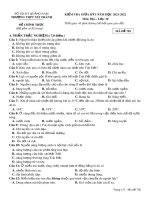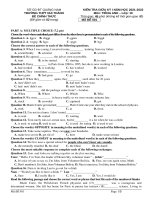Đề thi giữa học kì 1 môn Tiếng Anh lớp 10 năm 2021-2022 có đáp án - Trường THPT Núi Thành
Bạn đang xem bản rút gọn của tài liệu. Xem và tải ngay bản đầy đủ của tài liệu tại đây (782.9 KB, 4 trang )
SỞ GD-ĐT QUẢNG NAM
TRƯỜNG THPT NÚI THÀNH
ĐỀ CHÍNH THỨC
(Đề gồm có 02 trang)
KIỂM TRA GIỮA KỲ I NĂM HỌC 2021-2022
Mơn: TIẾNG ANH – Lớp: 10
Thời gian: 45 phút (không kể thời gian giao đề)
MÃ ĐỀ 501
PART A: MULTIPLE CHOICE (7,2 pts)
Choose the word whose underlined part differs from the other three in pronunciation in each of the following questions..
Question 1. A. leave B. cheap
C. eaten
D. break
Question 2. A. wrong B. boss
C. sport
D. box
Choose the correct answer to each of the following questions.
Question 3. When I was young, I received some_________ training from my father.
A. scientifically
B. scientist
C. scientific
D. science
Question 4. He agreed.._________ the job as soon as possible.
A. start
B. to be started.
C. starting
D. to start
Question 5. Daisy_________ in Paris from 1980 to 1995, but she is now working in London.
A. had worked
B. is working
C. has worked
D. worked
Question 6. They sometimes_________ to work by bus.
A. have gone
B. had gone
C. go
D. went
Question 7. When they_________ again, they_________ each other for 10 years
A. met/ didn’t see
B. had met/ hadn’t seen
C. had met/ didn’t see
D. met/ hadn’t seen
Question 8. _________ did the package come from? ~ London.
A. When
B. Where
C. Which
D. Who
Question 9. We were_________ in heavy traffic so we were twenty minutes late.
A. stuck
B. crowded
C. captured
D. got
Question 10. Marrie Currie got married_________ Pierre Curie one year after they met in the school of physics.
A. with
B. to
C. at
D. from
Question 11. I’m not in a hurry. I don’t mind _________
A. to wait
B. waited
C. waiting
D. wait
Question 12. Tom rarely eats ice-cream now, but he_________ it a lot when he was a child.
A. is used to eating B. used to eat
C. is used for eating D. is used to eat
Choose the word(s) OPPOSITE in meaning to the underlined word(s) in each of the following questions.
Question 13. Take some aspirins. They can ease your headache.
A. make less severe B. get rid of
C. hurt
D. make some serious
Choose the word(s) CLOSEST in meaning to the underlined word(s) in each of the following questions.
Question 14. We live near a special school for people who can’t hear any sounds.
A. the mentally retarded B. the deaf
C. the blind
D. the dumb
Choose the most suitable response to complete each of the following exchanges.
Question 15. Tom and John are talking together on the first meeting.
Tom: ‘“Hello, I’m Tom, the leader of Dream Sky volunteer team.” – John:“_______________”
A. It's nice of you so say so, I'm John, from Volunteer Bolivia. B. Fine, see you again soon, Minh.
C. Don’t mention it. I'm John, from Volunteer Bolivia. D. Nice to meet you. I’m John, from Volunteer Bolivia.”
Question 16. Nam is inviting Lan to go out for a drink
Nam : “ Would you like to have a drink ?’’ Lan: ‘’_______________’’
A. Sure
B. I really like it
C. Yes, I am
D. Yes, I would do
Read the following passage and choose the correct word or phrase that best fits each of the numbered blanks
Marie Curie, the Polish-born French physicist and (17)_________ was a courageous and
determined woman. She left her home for Paris to pursue her interest (18)_________ science. Living in
poverty, she still managed to graduate at the top of her class. She met Perrie Curie shortly after graduation
and married him a year later. Together, Perrie and Marie (19)_________ the most famous husband and wife
partnership in science history. They (20)_________ the Radioactive elements, Polonium and Radium.
They were awarded the Nobel Prize for Physics in 1903
.
Mã đề 501
Page 1/2
Question 17. A. chemistry
B. chemist
C. chemically D. chemical
Question 18. A. about
B. for
C. in
D. with
Question 19. A. established
B. organized
C. formed
D. built
Question 20.A. were discovering. B. have discovered C. discovered D. had discovered
Read the following passage and choose the correct answer to each of the questions
Orbis is an organisation which helps blind people of everywhere. It has built an eye hospital inside
an aeroplane and flown it all over the world with an international medica team. Samantha Graham, a
fourteen-year-old schoolgirl from England, went with the plane to Mongolia. Samantha tells the story of the
Eukhtuul, a young Mongolian girl.
Last year, when Eukhtuul was walking home from school, she was attacked by boys with sticks and
her eyes were badly damaged. Dr. Duffey, an Orbis doctor, said that without an operation she would never
see again. I thought about all the things I do that she couldn’t, things like reading schoolbooks, watching
television, seeing friends, and I realised how lucky I am.’
The Orbis team agreed to operate on Eukhtuul and I was allowed to watch, together with some
Mongolian medical students. I prayed the operation would be successful. The next day I waited nervously
with Eukhtuul while Dr. Duffey removed her bandages. “In six months your sight will be back to normal,”
he said. Eukhtuul smiled, her mother cried, and I had to wipe away some tears, too!’
Now Eukhtuul wants to study hard to become a doctor. Her whole future has changed thanks to a
simple operation. We should all think more about how much our sight means to us.’
Question 21. What information can be learned from this passage?
A. the difficulties for blind travellers
B. the best way of studying medicine
C. the life of schoolchildren in Mongolia D. the international work of some eye doctor
Question 22. The word "she" in the passage refers to_________
A. the nurse
B. the writer
C. the medical student
D. Eukhtuul
Question 23. Orbis is an(a) _________
A. organisation which helps blind people of everywhere.
B. organisation which helps sick people of everywhere.
C. hospital inside an aeroplane flies all over the world
D. hospital flies all over the world with an international medica team
Question 24. What is the result of Eukhtuul's operation?
A. After some time she will see as well as before.
B. She can see better but can never have normal eyes.
C. She can't see perfectly again.
D. Before she recovers, she needs another operation.
PART B: WRITING: (2.8 pts)
I. Combine each pair of sentences into one sentence as instructed:
Question 25. She worked hard for many years. Then she retired last month. (Use “BEFORE”)
_____________________________________________________________________________
Question 26. Peter is always late for class. This annoys the teacher. (Use “WHICH‘’)
_____________________________________________________________________________
Question 27. He usually drank tea after meals. He was used to this. (Use “USED TO’’)
_____________________________________________________________________________
II. Finish each of the following sentences in such a way that it means the same as the one printed
before it.
Question 28. It is not easy for me to remember my students’ names.
I have trouble ______________________________________________________________
Question 29. We spent 3 months finishing this project.
It took ____________________________________________________________________
Question 30. She has been working as a teacher for five years.
She started ________________________________________________________________
Question 31. He had just entered the office when he realized that he had forgotten his wallet.
No sooner ________________________________________________________________
_ The end_
Mã đề 501
Page 2/2
SỞ GD-ĐT QUẢNG NAM
TRƯỜNG THPT NÚI THÀNH
ĐỀ CHÍNH THỨC
(Đề gồm có 02 trang)
KIỂM TRA GIỮA KỲ I NĂM HỌC 2021-2022
Mơn: TIẾNG ANH – Lớp: 10
Thời gian: 45 phút (không kể thời gian giao đề)
ANSWER KEY
TRẮC NGHIỆM
Đề\câu
501
503
505
507
Đề\câu
501
503
505
507
1
D
C
B
A
13
D
D
B
B
2
C
D
C
C
14
B
B
A
D
3
C
B
D
A
15
D
A
D
D
4
D
D
D
A
16
A
A
A
A
5
D
B
A
D
17
B
D
C
B
6
C
B
A
A
18
C
C
C
D
7
D
C
B
D
19
C
C
B
A
8
B
D
D
D
20
C
C
B
C
9
A
B
A
A
21
D
D
C
C
10
B
C
B
A
22
D
C
A
B
11
C
D
B
B
23
A
A
A
A
12
B
C
D
D
24
A
C
A
A
TỰ LUẬN
501
I. Combine each pair of sentences into one sentence as instructed:
Question 25. She worked hard for many years. Then she retired last month. (Use
“BEFORE”)
Before she retired last month, she had worked hard for many years.
Question 26. Peter is always late for class. This annoys the teacher. (Use “WHICH‘’)
Peter is always late for class, which annoys the teacher.
Question 27. He usually drank tea after meals. He was used to this. (Use “USED TO’’)
He used to drink tea after meals.
II. Finish each of the following sentences in such a way that it means the same as
the one printed before it.
Question 28. It is not easy for me to remember my students’ names.
I have trouble remembering my students’ names.
Question 29. We spent 3 months finishing this project.
It took us 3 months to finish this project.
Question 30. She has been working as a teacher for five years.
She started working/ to work as a teacher five years ago.
Question 31. He had just entered the office when he realized that he had forgotten his wallet.
No sooner had he entered the office than he realized that he had forgotten his wallet.
502
I. Combine each pair of sentences into one sentence as instructed:
Question 25. He worked hard for ages . Then he retired last week. (Use “BEFORE”)
Before he retired last week, he had worked hard for ages.
Question 26. She often cried when she was a child. She was used to this. (Use “USED TO’’)
She used to cry when she was a child.
Question 27. Sheila couldn't come to the party. This was a pity. (Use “WHICH‘’)
Sheila couldn't come to the party, which was a pity.
II. Finish each of the following sentences in such a way that it means the same as
the one printed before it.
Question 28. He has been working as a teacher for five years.
He started working/ to work as a teacher five years ago.
Question 29. It is not easy for me to remember what I’ve learnt.
I have trouble remembering what I’ve learnt.
Question 30. She spent 3 months finishing this project.
It took her 3 months to finish this project.
Question 31. She had just entered the office when she realized that she had forgotten her wallet.
No sooner had she entered the office than she realized that she had forgotten her wallet.









